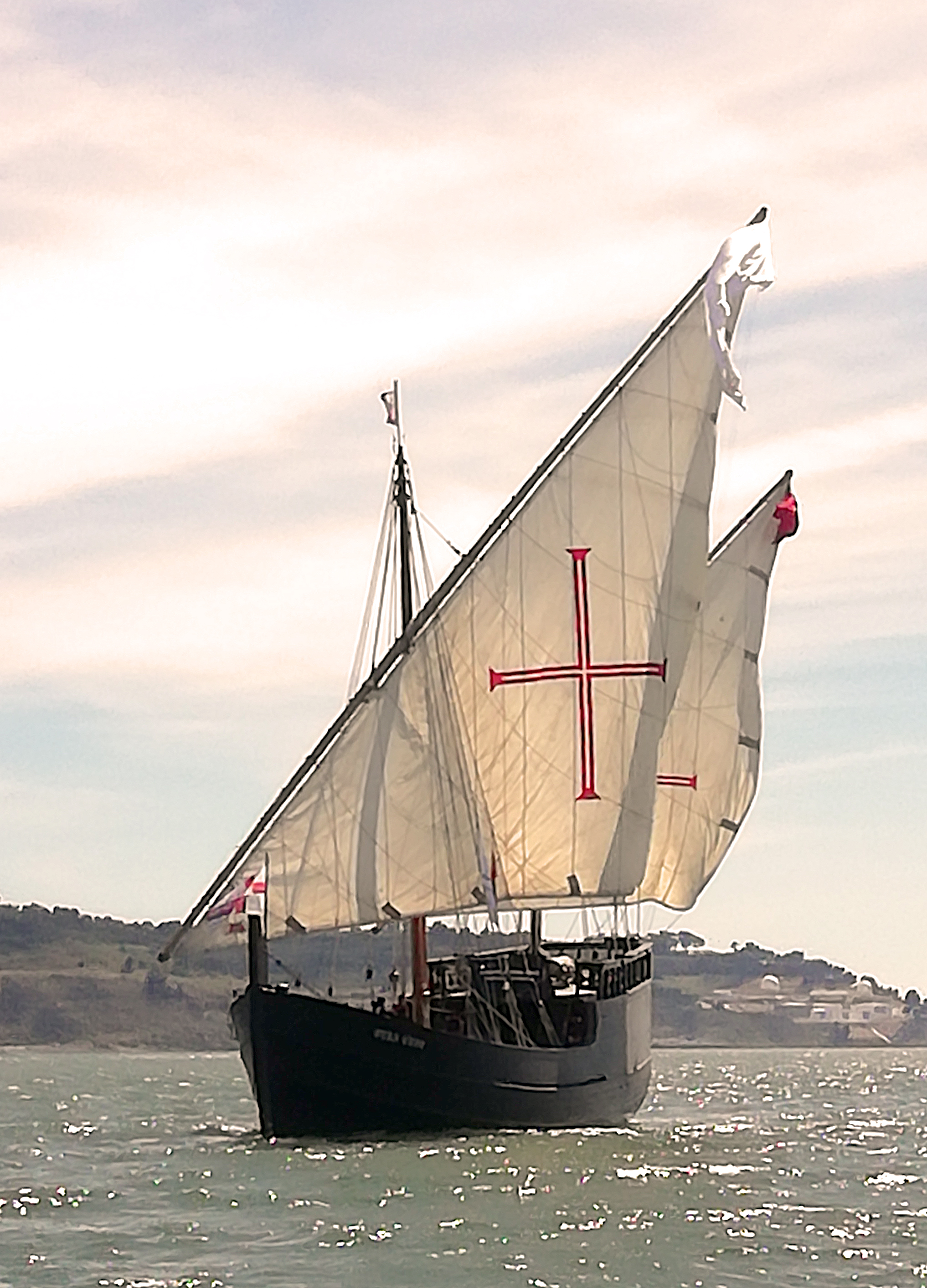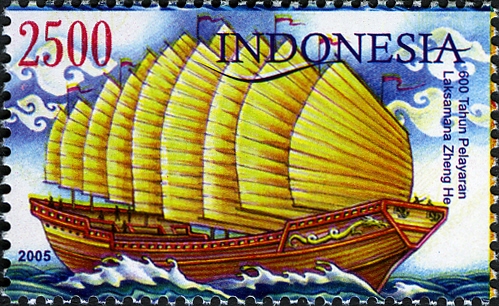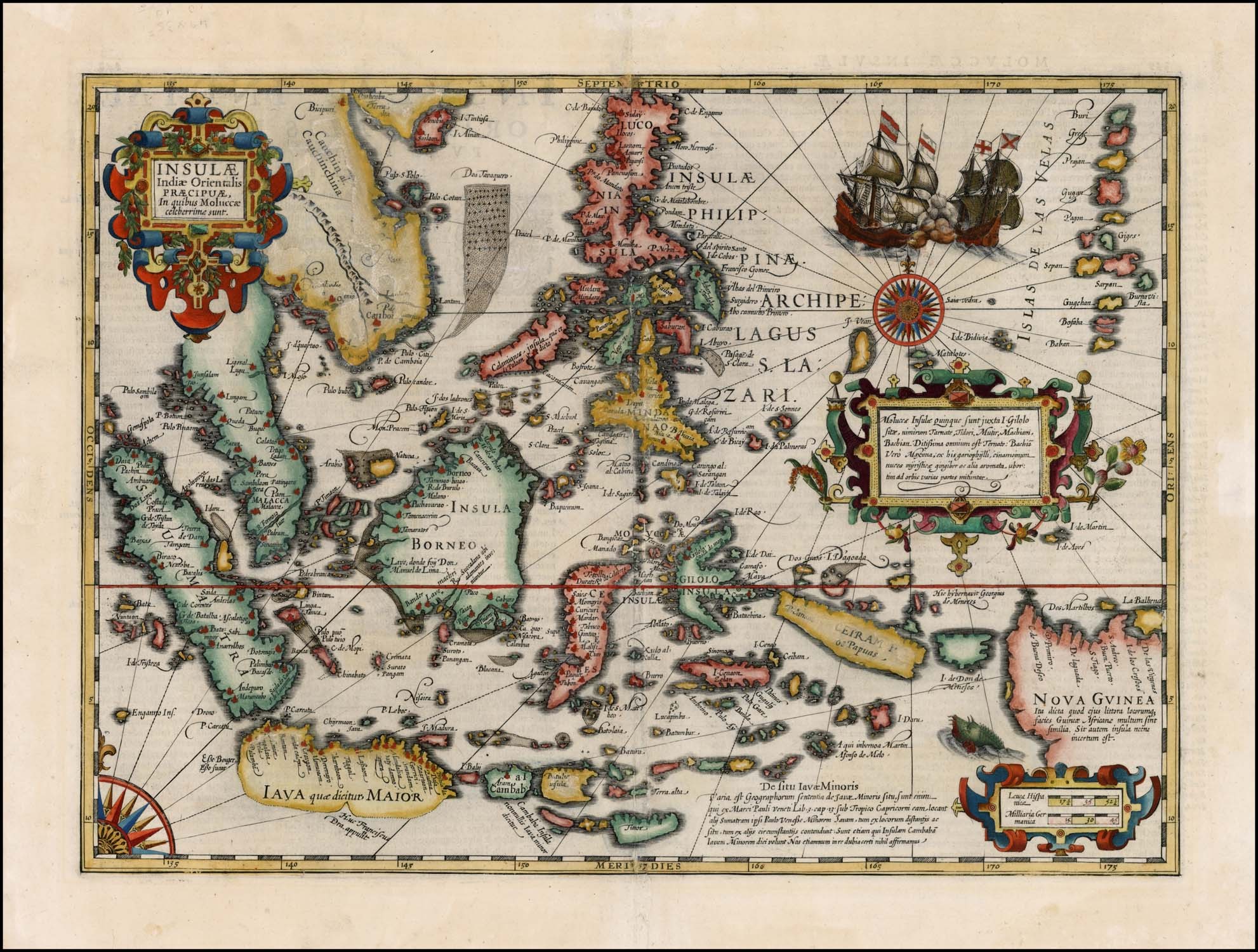|
The Portuguese In Indonesia (1512–1850)
The Portuguese Empire, Portuguese were the first Europeans to establish a Evolution of the Portuguese Empire#Asia and Oceania, colonial presence in the Indonesian Archipelago. Their quest to dominate the source of the spices that sustained the lucrative spice trade in the early 16th century, along with missionary efforts by Roman Catholic orders, saw the establishment of trading posts and forts, and left behind a Portuguese cultural element that remains in modern-day Indonesia. Establishment Europeans were making technological advances in the early 16th century; new-found Portuguese expertise in navigation, shipbuilding and weaponry allowed them to make daring expeditions of exploration and expansion. Starting with the first exploratory expeditions sent from newly conquered Portuguese Malacca, Malacca in 1512, the Portuguese were the first Europeans to arrive in the East Indies, and sought to dominate the sources of valuable spices and to extend their Roman Catholic missionar ... [...More Info...] [...Related Items...] OR: [Wikipedia] [Google] [Baidu] |
Insulindia
The Malay Archipelago ( Indonesian/ Malay: , tgl, Kapuluang Malay) is the archipelago between mainland Indochina and Australia. It has also been called the " Malay world," " Nusantara", "East Indies", Indo-Australian Archipelago, Spices Archipelago and other names over time. The name was taken from the 19th-century European concept of a Malay race, later based on the distribution of Austronesian languages. Situated between the Indian and Pacific Oceans, the archipelago of over 25,000 islands and islets is the largest archipelago by area and fourth by number of islands in the world. It includes Brunei, East Timor, Indonesia, Malaysia (East Malaysia), Papua New Guinea, the Philippines and Singapore.''Encyclopædia Britannica''. 2006. Chicago: Encyclopædia Britannica, Inc. The term is largely synonymous with Maritime Southeast Asia. [...More Info...] [...Related Items...] OR: [Wikipedia] [Google] [Baidu] |
John III Of Portugal
John III ( pt, João III ; 7 June 1502 – 11 June 1557), nicknamed The Pious (Portuguese: ''o Piedoso''), was the King of Portugal and the Algarves from 1521 until his death in 1557. He was the son of King Manuel I and Maria of Aragon, the third daughter of King Ferdinand II of Aragon and Queen Isabella I of Castile. John succeeded his father in 1521 at the age of nineteen. During his rule Portuguese possessions were extended in Asia and in the New World through the Portuguese colonization of Brazil. John III's policy of reinforcing Portugal's bases in India (such as Goa) secured Portugal's monopoly over the spice trade of cloves and nutmeg from the Maluku Islands. On the eve of his death in 1557, the Portuguese empire had a global dimension and spanned almost . During his reign, the Portuguese became the first Europeans to make contact with Japan (during the Muromachi period). He abandoned the Muslim territories in North Africa in favor of the trade with India and investme ... [...More Info...] [...Related Items...] OR: [Wikipedia] [Google] [Baidu] |
Evolution Of The Portuguese Empire
This article is a comprehensive list of all the actual possessions of the Portuguese Empire. Europe Portuguese founded factories in various places in Europe, with a purely commerce-focused strategy, different from the other continents. * Antwerp - factory * Bruges - factory * Chios - factory (founded in 1499 - ?) * Venice - factory (c. 1508) Africa Portuguese presence in Africa started in 1415 with the conquest of Ceuta and is generally viewed as ending in 1975, with the independence of its later colonies, although the present autonomous region of Madeira is located in the African Plate, some 650 km (360 mi) off the North African coast, Madeira belongs and has always belonged ethnically, culturally, economically and politically to Europe, some 955 km (583 mi) from the European mainland. * Angola/Portuguese West Africa: colony (1575–1589); crown colony (1589–1951); overseas province (1951–1971); state (1971–1975). Independence in 1975. * Arguin/Argu ... [...More Info...] [...Related Items...] OR: [Wikipedia] [Google] [Baidu] |
Age Of Discovery
The Age of Discovery (or the Age of Exploration), also known as the early modern period, was a period largely overlapping with the Age of Sail, approximately from the 15th century to the 17th century in European history, during which seafaring Europeans explored and colonized regions across the globe. The extensive overseas exploration, with the Portuguese and Spanish at the forefront, later joined by the Dutch, English, and French, emerged as a powerful factor in European culture, most notably the European encounter and colonization of the Americas. It also marks an increased adoption of colonialism as a government policy in several European states. As such, it is sometimes synonymous with the first wave of European colonization. European exploration outside the Mediterranean started with the maritime expeditions of Portugal to the Canary Islands in 1336, and later with the Portuguese discoveries of the Atlantic archipelagos of Madeira and Azores, the coast of West Afr ... [...More Info...] [...Related Items...] OR: [Wikipedia] [Google] [Baidu] |
Francisco Serrão
Francisco Serrão (died 1521) was a Portuguese explorer and a possible cousin of Ferdinand Magellan. His 1512 voyage was the first known European sailing east past Malacca through modern Indonesia and the East Indies. He became a confidant of Sultan Bayan Sirrullah, the ruler of Ternate, becoming his personal advisor. He remained in Ternate where he died around the same time Magellan died. Voyage to the Indies Serrão served as captain of one of three vessels (and second in overall command under António de Abreu) sent from Malacca by Afonso de Albuquerque to find the Spice Islands of Banda in Maluku in 1511. Banda was the world's only source of nutmeg and mace, spices used as flavourings, medicines and preserving agents that were at the time highly valued in European markets. The Portuguese sought to dominate the source, rather than relying on Arab traders who sold it to the Venetians for exorbitant prices. Malay pilots guided the expedition east via Java and along the Lesse ... [...More Info...] [...Related Items...] OR: [Wikipedia] [Google] [Baidu] |
António De Abreu
António de Abreu () was a 16th-century Portuguese navigator and naval officer. He participated under the command of Afonso de Albuquerque in the conquest of Ormus in 1507 and Malacca in 1511, where he got injured. Departing from Malacca in November 1511 with four ships, in an exploratory voyage to the 'Spice Islands' of Maluku, he led the first European expedition to reach Timor and the Banda Islands, in Indonesia, in 1512. Abreu was born about 1480 in Madeira, the son of nobleman João Fernandes de Andrade. After serving in Morocco, he fought in the campaigns of Afonso de Albuquerque in India and the Red Sea. On 25 July 1511, during the conquest of Malacca, António de Abreu led the Chinese junk that went up the Malacca River at high tide, allowing the Portuguese contingent to land and conquer the city in August. Severely wounded by a musket shot in the face, he lost several teeth and part of his tongue but indignantly refused Albuquerque's request to hand over his command. ... [...More Info...] [...Related Items...] OR: [Wikipedia] [Google] [Baidu] |
Alfonso De Albuquerque
Afonso de Albuquerque, 1st Duke of Goa (; – 16 December 1515) was a Portuguese general, admiral, and statesman. He served as viceroy of Portuguese India from 1509 to 1515, during which he expanded Portuguese influence across the Indian Ocean and built a reputation as a fierce and skilled military commander. Albuquerque advanced the three-fold Portuguese grand scheme of combating Islam, spreading Christianity, and securing the trade of spices by establishing a Portuguese Asian empire. Among his achievements, Albuquerque managed to conquer Goa and was the first European of the Renaissance to raid the Persian Gulf, and he led the first voyage by a European fleet into the Red Sea. He is generally considered a highly effective military commander, and "probably the greatest naval commander of the age", given his successful strategy — he attempted to close all the Indian Ocean naval passages to the Atlantic, Red Sea, Persian Gulf, and to the Pacific, transforming it into a Portugu ... [...More Info...] [...Related Items...] OR: [Wikipedia] [Google] [Baidu] |
Portuguese Timor
Portuguese Timor ( pt, Timor Português) was a colonial possession of Portugal that existed between 1702 and 1975. During most of this period, Portugal shared the island of Timor with the Dutch East Indies. The first Europeans to arrive in the region were the Portuguese in 1515.West, p. 198. Dominican friars established a presence on the island in 1556, and the territory was declared a Portuguese colony in 1702. Following the beginning of the Carnation Revolution (a Lisbon-instigated decolonisation process) in 1975, East Timor was invaded by Indonesia. However, the invasion was not recognized as legal by the United Nations (UN), which continued to regard Portugal as the legal Administering Power of East Timor. The independence of East Timor was finally achieved in 2002 following a UN-administered transition period. History Early colonialists Prior to the arrival of European colonial powers, the island of Timor was part of the trading networks that stretched between India and ... [...More Info...] [...Related Items...] OR: [Wikipedia] [Google] [Baidu] |
Dutch East India Company In The Malay Archipelago
Company rule in the Dutch East Indies began when the Dutch East India Company (Dutch: Vereenigde Oostindische Compagnie, "United East India Company"; VOC) appointed the first governor-general of the Dutch East Indies in 1610, and ended in 1800 when the bankrupt company was dissolved and its possessions were nationalized as the Dutch East Indies. By then it exerted territorial control over much of the archipelago, most notably on Java. In 1603, the first permanent Dutch trading post in Indonesia was established in Banten, northwest Java. The official East Indies government, however, was not created until Pieter Both was made governor-general in 1610. In that same year, Ambon Island was made headquarters of the VOC's East Indies. Batavia was made the capital from 1619 onward. Corruption, war, smuggling, and mismanagement resulted in the company's bankruptcy by the end of the 18th century. The company was formally dissolved in 1800 and its colonial possessions were nationalized ... [...More Info...] [...Related Items...] OR: [Wikipedia] [Google] [Baidu] |
Spread Of Islam In Indonesia
The history of the arrival of Islam in Indonesia is somewhat unclear. One theory states that Islam arrived directly from Arabia as early as the 9th century, during the time of the Umayyad and Abbasid caliphates. Another theory credits Sufi travelers for bringing Islam in the 12th or 13th century either from Gujarat in India or from Persia. Before the archipelago's conversion to Islam, the predominant religions in Indonesia were Hinduism (particularly its Shaivism tradition) and Buddhism. The islands that now constitute Indonesia have been recognized for centuries as a source of spices such as nutmeg and cloves, which were key commodities in the Spice trade long before the Portuguese arrived in the Banda Islands in 1511. Due to the archipelago's strategic place as the gateway between the Muslim world and Imperial China, it became a busy international hub for merchants engaged in many forms of trade. It became the place where different peoples shared their respective cultures, on ... [...More Info...] [...Related Items...] OR: [Wikipedia] [Google] [Baidu] |
North Maluku
North Maluku ( id, Maluku Utara) is a province of Indonesia. It covers the northern part of the Maluku Islands, bordering the Pacific Ocean to the north, the Halmahera Sea to the east, the Molucca Sea to the west, and the Seram Sea to the south. The provincial capital is Sofifi on the largest island of Halmahera, while the largest city is the island city of Ternate. The population of North Maluku was 1,038,087 in the 2010 census,Central Bureau of Statistics: ''Census 2010'' , retrieved 17 January 2011 making it one of the least-populous provinces in Indonesia, but by the 2020 Census the population had risen to 1,282,937, and the official estimate as at mid 2021 was 1,299,177. North Maluku was originally the centre of the four largest Islamic sultanates in the eastern Indonesian archi ... [...More Info...] [...Related Items...] OR: [Wikipedia] [Google] [Baidu] |
East Indies
The East Indies (or simply the Indies), is a term used in historical narratives of the Age of Discovery. The Indies refers to various lands in the East or the Eastern hemisphere, particularly the islands and mainlands found in and around the Indian Ocean by Portuguese explorers, soon after the Cape route was discovered. Nowadays, this term is broadly used to refer to the Malay Archipelago, which today comprises the Philippine Archipelago, Indonesian Archipelago, Malaysian Borneo, and New Guinea. Historically, the term was used in the Age of Discovery to refer to the coasts of the landmasses comprising the Indian subcontinent and the Indochinese Peninsula along with the Malay Archipelago. Overview During the era of European colonization, territories of the Spanish Empire in Asia were known as the Spanish East Indies for 333 years before the American conquest. Dutch occupied colonies in the area were known for about 300 years as the Dutch East Indies till Indonesian indepen ... [...More Info...] [...Related Items...] OR: [Wikipedia] [Google] [Baidu] |

.jpg)


.jpg)


